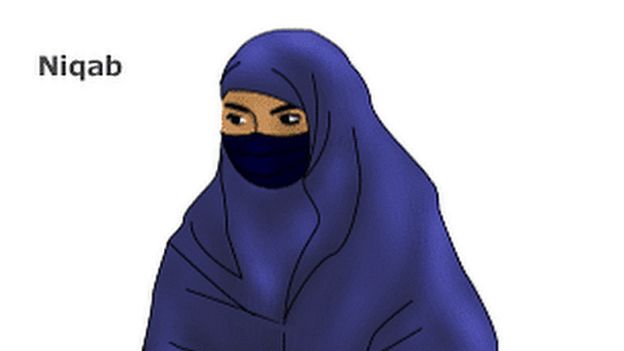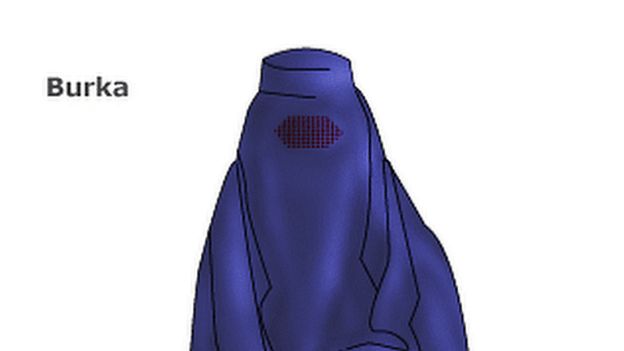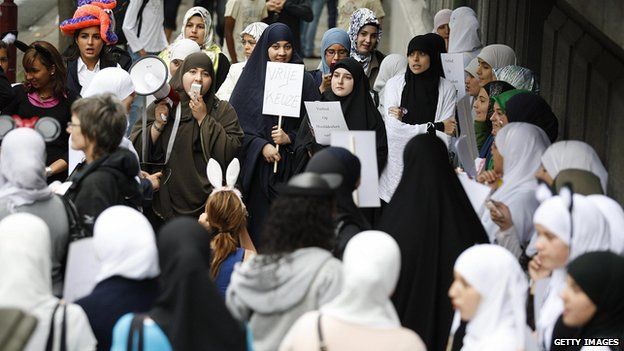Integrating Muslim Women Into Western Society
"[A person concealing her face is] disrespectful [to others and] incompatible with the values in Danish society."
Justice Minister Soren Pape Poulsen, Denmark
"I want to say solemnly, the burqa is not welcome in France. In our country, we can't accept women prisoners behind a screen, cut off from all social life, deprived of all identity."
"That's not our idea of freedom."
Then-French President Nicolas Sarkozy
"Covering one's face in public at a time of terrorism presents a danger to society ..."
"You could carry a rocket launcher under your veil. It's not funny."
Former Latvian President Vaira Vike-Friberga
"We can say all these things about them [European heads of state] violating freedom of religion, but over there, their own highest court is saying to them, 'You're not."
"You're justified in what you're doing."
Asma Uddin, senior scholar, faculty member, Religious Freedom Center, Newseum Institute, Washington, D.C.
 |
| A Muslim woman walks over the Christmas market in Frankfurt, Germany |
"This disguise [wearing of the burqa or niqab] cannot be reconciled with a European society of free individuals. The problem is that the CDU [Christian Democratic Union] of Mrs. [Chancellor Angela] Merkel is divided over it, so nothing has been done yet in Germany."
"But this situation will not last long."
AfD leader in the Bundestag Alice Weidel
"We knew that the Great Mosque, managed by Saudi Arabia [in particular, the Islamic World League], was at the heart of a system of financing of institutions that propagate Salafism, Wahhabism, which are versions ultra-rigorous forms of Islam, considering Westerners as kaffirs – disbelievers, obliging women to wear the niqab or forbidding them to see a male gynecologist."
"We have decided to stop the link between the great mosque and Saudi Arabia."
George Dallemagne, member, Belgian federal parliament

"It is true that very few women dare wear the niqab or burqa in most European countries, but in the UK, or in the USA, you see plenty of them in areas where there is a Muslim population."Denmark has become the fifth of European countries to ban face coverings in public places, a policy obviously enough aimed at Muslim women living in Denmark. Copenhagen saw protests against the new law, but police have wasted little time enforcing the law. A 28-year-old wearing a niqab, the veil covering all but the eyes was attacked on August 3 by another Danish woman trying to yank off her veil. Police fined the Muslim woman $200, but evidently failed to attend to the Danish woman who obviously assaulted the fined woman.
"Countries such as Turkey, where the legacy of Ataturk had pushed back religious obscurantism, the niqab is back with a vengeance. In some areas of Istanbul, it is now the normal garb."
"This points to a rampant Islamization of Europe."
Nicola Tournay, communications director, Belgian People's Party (PP)

Europe is gathering itself together in a bond to outlaw full-face coverings in public -- enacting legislation to make wearing the burqa or niqab unlawful -- in the past three years. Nationwide bans forbidding partially or fully covering the face in public places reflect European lawmakers rejecting Islamic cultural practices that denigrate Muslim women by making them disappear under black tents. The latest country to partially ban face veils in public areas like schools and hospitals but not public streets is the Netherlands.
Spain and Italy banned face coverings in individual cities and towns; others have reviewed proposals at the local or national level to enact such bans. France was the first in 2011, to initiate this trend, and just incidentally also happens to be the European country with the greatest number of Muslim immigrants, followed closely by Germany. Face veils represent an insult to any country's social contract, that some choose to, or are expected to, sequester themselves behind a face covering to remain anonymous while in public.
This is a practice which, apart from being demeaning to the person, individuality and human rights of anyone participating in it, is an affront against civilized society where people face one another even in the most casual of circumstances. The alienating effect of the burqa or the niqab is undeniable. That relatively few Muslim women choose to partially or fully cover their faces is the usual excuse trotted out to those who claim 'diversity' must be tolerated and respected.
Latvia is entertaining a debate on a proposed ban on face veils, where an estimated three women among the entire population wear the burqa.
 |
Security is cited as a concern in such situations. But the wearing of face veils is clearly inconsistent with "European values". Thomas de Maiziere, then interior minister of Germany, called for a nationwide ban on face veils in 2017, stating: "We are an open society. We show our face. We are not burqa". Despite objections, the inclination among democratic Western nations is to look askance at the toleration hitherto espoused for Muslim face coverings and the move to ban them is growing, as governments are elected that reflect a nationalist inclination.
And that inclination is directly attributable to the influx of Muslims in European society, failing to meld into the existing society's norms, bringing with them inequality and customs clearly at odds with the traditions and values that have long been normalized in Europe. France, Belgium, Bulgaria, Austria, Denmark and the Netherlands, Spain and Italy have adopted local bans in cities or towns, alongside nation-wide or partial bans.
Germany, Latvia, Finland, Switzerland and Luxembourg are all awaiting local or national bans while legislation is yet pending. The European Court of Human Rights in 2014 upheld the French ban on face veils in a ruling that found for the state against a 24-year-old Muslim woman whose argument was that wearing her burqa was a matter of religious freedom. Two Belgian women saw the court rule against face veils, that the ban fails to violate the European Convention on Human Rights.
And in Canada? A woman from Pakistan insisted she had the right under Canada's Charter rights and freedoms to wear a face veil at her citizenship swearing-in ceremony. While her contention was initially rejected and she was instructed to remove her veil or bypass the ceremony, effectively not achieving citizenship, the Federal Court of Appeal later ruled she was within her rights, and she subsequently wore her veil to swear her oath of citizenship.
 |
| Zunera Ishaq holds her citizenship certificate after swearing the oath on Friday afternoon. She started wearing a niqab at age 15, against her family's wishes. (Sylvia Thomson/CBC) |
Labels: Burqa, Canada, Culture, Europe, Immigration, Islam, Niqab
0 Comments:
Post a Comment
<< Home